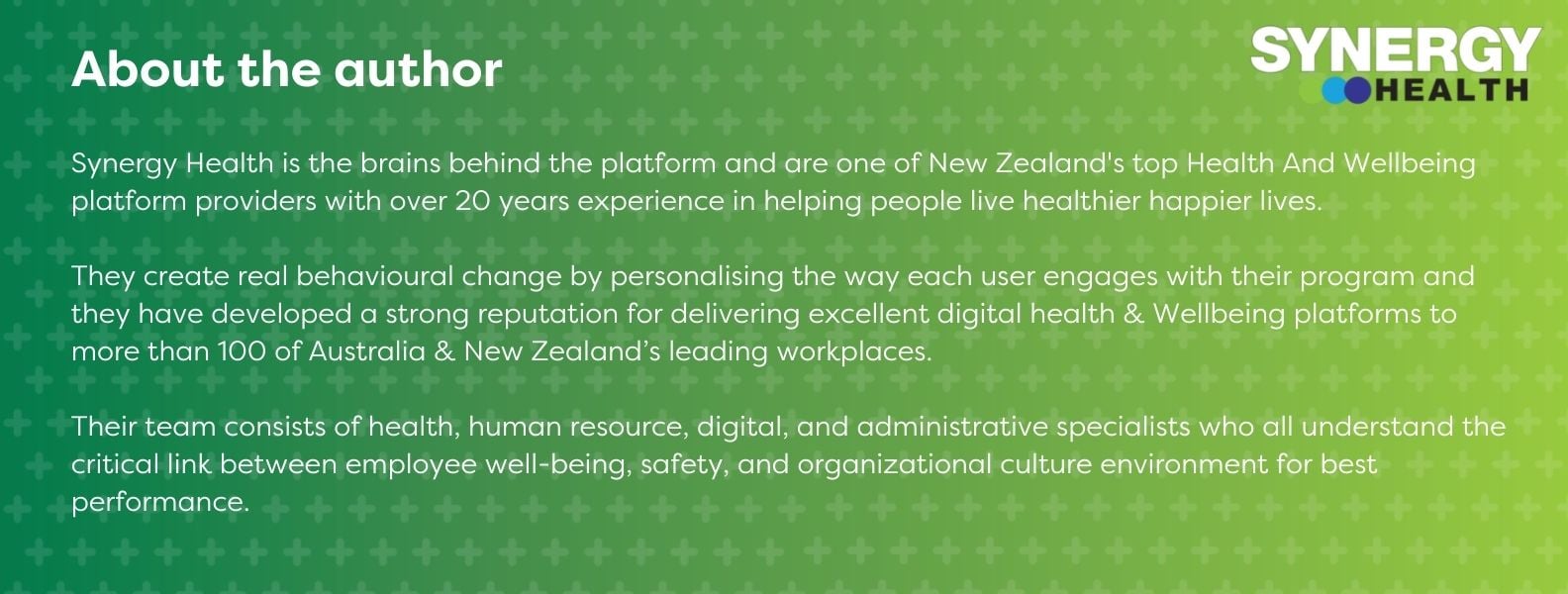Synergy Health are the team behind GoodForYou - your personalised wellbeing program that provides the tools and support you need to improve your health and mental wellbeing. They have a wide, varied and constantly growing range of wellness resources for you to access from their group of experts. Whether it's fitness, diet, sleep, social connection or competition, they take a holistic approach to getting the most out of life.
We will regularly feature articles from The Synergy Health team and in this article they delve into why values are the key to living a fulfilled life
Values are what matter most to us. They underpin our decision making and help us feel fulfilled.
We feel our best when they are being fulfilled and struggle when they are compromised. Clarifying and deepening our sense of values helps to ground us, regardless of the shifting and uncertain landscape around us.
Personal values differ from person to person based on our unique upbringing, beliefs and experiences in life. When we experience value fulfilment in what we do we are more likely to feel happy and maintain a sense of enjoyment, engagement and overall wellbeing.
When our values are not being fulfilled or are actively being compromised by what is going on, our ability to maintain this sense of wellbeing is more challenging. How we lead our lives and navigate change has the potential to either fulfil or compromise some of our values.
Clarifying our personal values is empowering. It allows us to proactively look for ways to fulfil them as well as clearly communicate what we want and need.
CLARITY IS KEY
Values come out of our experiences, shape our life’s preferences, and dictate our emotional responses. We all have unique personal histories and neural networks, so the same word often means very different things to different people.
What matters most is not the word we choose but the way that we define it. The real benefit of the discovery process is understanding how you personally define your values. If you say you value 'fairness' what does this actually mean? What are the metrics you are using? Is it based on your personal preferences or some objective measure?
We can confuse the vehicle for the value. As an example, people often say they value family. However, when you dig deeper you begin to understand that family is the vehicle or way that people fulfil their personal values.
The underlying values may be things like helping, love, recognition, or achievement.
Let’s say you have a helping value – your ability to design your day to help your children feels fulfilling because it promotes this value.
Where we often see this come to light is in times of change. For example, the ‘Empty Nest’ syndrome may be experienced by parents who fulfil their values through their children and when their children leave home, they’ve lost the primary vehicle or means of getting those values fulfilled. That empty feeling lingers until the parent finds a new vehicle or means of promoting those things that are important to them.
Using a values framework can help you manage change. For the example above, the parent could ask themselves “What values are my children fulfilling? When they leave home what are some of the new ways I can promote my values and get that sense of fulfilment?”
It’s a similar strategy when managing the transition from work to retirement. Ask yourself “How is my workplace fulfilling those things that are important to me? When that vehicle is no longer available to me, what are the things I can incorporate into my week to get a sense of fulfilment?”
Another example is the situation many of us find ourselves in now with the working from home vs at the office scenario. These are two different environments that are going to influence your ability to promote your personal values.
A person who values ‘recognition’ and has a manager in the office that affirms them and provides them with ongoing feedback through the day is not going to get that same amount of feedback and degree of recognition at home. This can leave them wondering why they feel disengaged from their job. The question to ask of yourself or the people you are working with is “What’s are some new strategies that can be implemented to get that same level of values fulfilment from home?” This might be as simple as a ‘Celebration’ Slack channel where you can give and receive shoutouts amongst the team for great work done.
As the current environment is constantly changing, we are vulnerable to not having our values fulfilled unless we take the time to get clarity on what matters most to us and find creative solutions and strategies to promote our values regardless of what’s happening around us.
Take some time to build strategies alongside the primary ways you’re currently fulfilling your values so you have options if and when things change.

USE YOUR EMOTIONS AS INDICATORS
Sometimes we’re not even aware our values are being compromised. Instead, we notice negative indicators of stress like finding it hard to concentrate, or feeling intolerant toward certain people or situations. Maybe we notice we’re feeling more tired, or that we are disengaging and pulling away from the people around us.
Like layers of an onion, these indicators can start to build up and we start blaming the external factors that have nothing to do with what’s going on at the core.
Sally really values control and wants everything to be organised and clear. Things have been changing at work and leaving her feeling uncertain and compromising her control value. She finds herself becoming increasingly frustrated with little things at work and when her co-worker Michael leaves the microwave door open, it’s the last straw.
Sometimes our values are compromised in one area of life and the stress indicators show up elsewhere. If we’re struggling at home, it can impact how we show up to work and vice versa.
Arun is a teacher and has been dealing with a difficult class all year. His partner is confused as to why he seems more demanding and nit-picky about little things at home. He doesn’t fully understand what’s happening himself, he just knows he feels stressed.
Without a values-based framework, we can default to managing the superficial symptoms and go round in circles with no real progress. We present those surface-related issues to our partners or managers, who start trying to deal with the symptoms and then wonder why they’re not getting any resolution.
Next time you’re feeling frustrated or stressed, ask yourself “Why am I feeling this way? Which value is being compromised?”
Are you addressing the things that are uniquely important to you at the core are you caught up in the symptomatic fringe stuff?
HOW TO IDENTIFY YOUR VALUES
One of the best ways to identify what your values really are is to pay attention to your emotional responses. When you feel good, take a moment to consider which values are being promoted. When you feel off or irritable, consider which values are being compromised.
If you don't know where to start, we suggest to register for our upcoming webinar to listen to Brad Norris - the Owner and Managing Director of Synergy Health Ltd - as he will talk about the importance of Values and provide tips to help identify your personal values. To register, please click on the image below.





